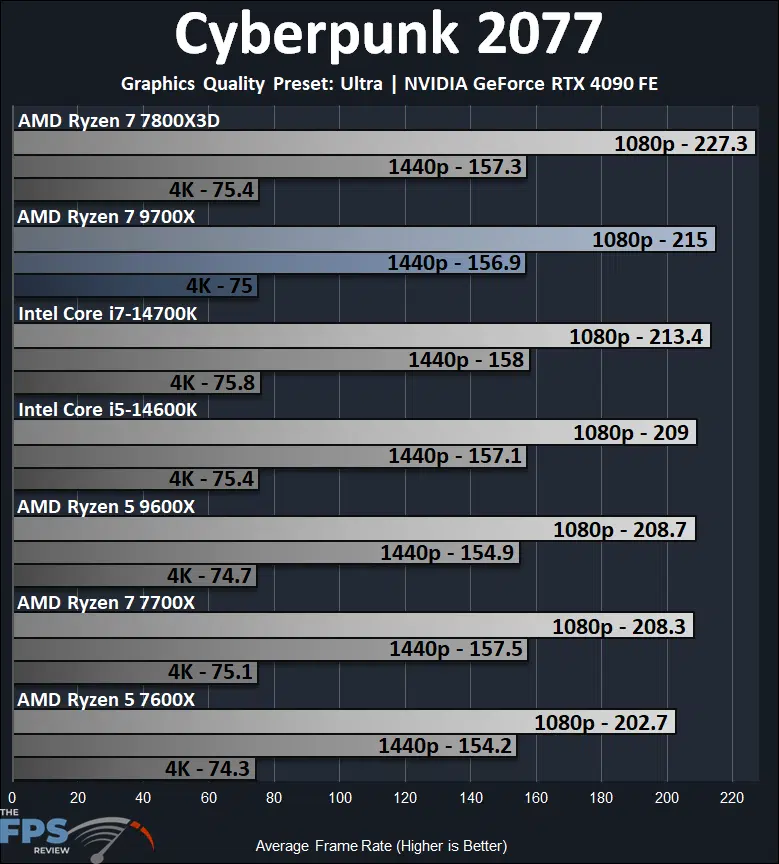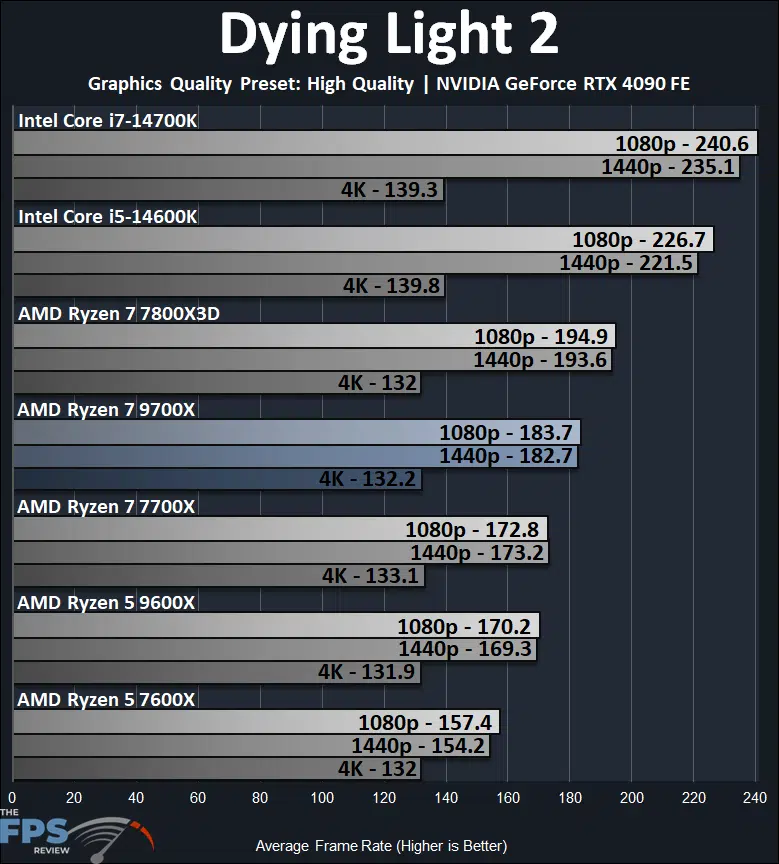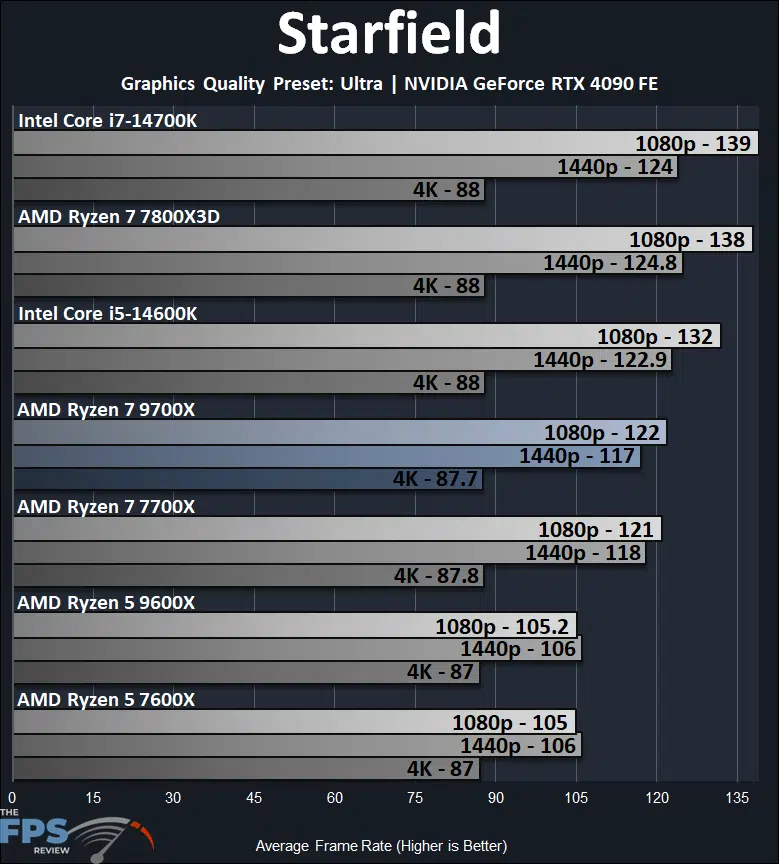Gaming Continued
We are going to include 1080p, 1440p, and 4K performance to see the overall big picture of performance. That said, you’ll want to focus on the 1080p results primarily to gain a sense of the level of framerate each CPU is able to provide to the GPU, it is the best predictor of potential performance. In addition, we think you’ll see some interesting scaling starting to happen in the 1440p area as well in some games between the CPUs, so look for that.
For testing, we are using an NVIDIA GeForce RTX 4090 Founders Edition video card with driver version 560.70. All games are being run in their “Ultra” game settings, at native resolution, and with no ray tracing. Each graph is first sorted by 1080p performance, and then second by 1440p performance. In this way, you’ll see which is the fastest CPU with a 1080p resolution. For games with a built-in benchmark, the benchmark is used, in games that do not have a benchmark we do a manual run-through.
Cyberpunk 2077

Good ole Cyberpunk 2077 is showing us some differences at 1080p, and even some at 1440p. The top performer is the AMD Ryzen 7 7800X3D with 227.3 FPS at 1080p and nearly the highest 1440p performance as well. However, right below that, second on the chart is the brand new AMD Ryzen 7 9700X at 215 FPS at 1080p and very close 1440p performance. After that are the two Intel Core CPUs, 14700K, and 14600K, and then the other CPUs to follow. The AMD Ryzen 7 9700X is 3% faster than the Ryzen 7 7700X and 5% behind the Ryzen 7 7800X3D. The AMD Ryzen 7 9700X is 3% faster than the Ryzen 5 9600X.
Dying Light 2

Dying Light 2 actually had some pretty significant performance differences between the CPUs, and some CPU bottlenecks showed up as well on some CPUs. Firstly, the fastest CPUs for this game ended up being the Intel Core i7-14700K and Intel Core i5-14600K, leading the back at 240 FPS and 226 FPS respectively at 1080p. This was then followed by the AMD Ryzen 7 7800X3D at 194 FPS, but we immediately saw a bottleneck on this CPU between 1440p to 1080p. It seems the CPU isn’t quite enough to push 1080p further past 1440p performance.
We also further see some CPU bottlenecks on every other CPU as well, the Ryzen 7 9700X, 7700X, 9600X, and 7600X all have some bottlenecking at 1440p to 1080p. That said, the Ryzen 7 9700X does end up being 6% faster than the AMD Ryzen 7 7700X, so it does have a pretty decent uplift over the previous generation here, despite the bottlenecking. The Ryzen 7 9700X is 6% behind the Ryzen 7 7800X3D as well on performance. However, the Ryzen 7 9700X is 8% faster than the Ryzen 5 9600X.
Starfield

Oops, we also see some bottlenecking happening in Starfield as well, especially between the 9600X and 7600X at 1440p to 1080p. There might even be some on the 9700X as well to a degree. The fastest CPUs for this game are the Intel Core i7-14700K and AMD Ryzen 7 7800X3D which match performance at 1080p and 1440p. Below that is the 14600K, and then the new AMD Ryzen 7 9700X.
The AMD Ryzen 7 9700X ends up providing just a 1% advantage over the Ryzen 7 7700X, indicating this game just simply may be bottlenecked on these CPUs. Still, it is 16% faster than the AMD Ryzen 5 9600X, showing that it does make a difference. The Ryzen 7 9700X is 12% behind the Ryzen 7 7800X3D on performance.
Assassin’s Creed Mirage

Assassin’s Creed Mirage is showing a pretty decent performance difference between the CPUs at 1080p, and even some at 1440p. The AMD Ryzen 7 7800X3D is the top performer at 223 FPS at 1080p, followed by the two Intel CPUs, and then the new AMD Ryzen 7 9700X.
The AMD Ryzen 7 9700X is 3% faster than the AMD Ryzen 7 7700X, and 6% faster than the AMD Ryzen 5 9600X. Even more interesting is that the Ryzen 7 9700X is 8% faster than the Ryzen 5 7600X at 1440p. The Ryzen 7 9700X is 11% behind the Ryzen 7 7800X3D.
